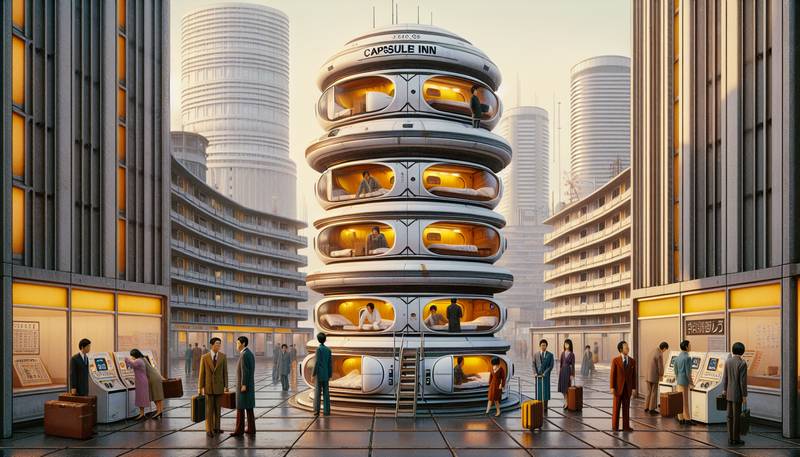Designing for Capsule Hotels: Maximizing Minimal Spaces

A Brief History of the Capsule HotelAh, the capsule hotel. A marvel of modern engineering and a godsend for weary travelers who just need a place to rest their heads. The first capsule hotel graced the world in 1979 in the bustling city of Osaka, Japan. It was called the Capsule Inn Osaka and was designed by none other than the renowned architect Kisho Kurokawa. These tiny, futuristic pods provided a much-needed respite for Japanese salarymen who missed the last train home after a night of heavy drinking - a story as old as time itself, or at least as old as Japanese office culture.What Makes a Great Capsule Hotel Design?Designing a capsule hotel is no small feat. One must consider the delicate balance between maximizing space and providing a comfortable, private experience for the guest. Like a world-class chef creating a delightful dish with only a few ingredients, the architect must utilize each square inch with surgical precision. So, let us delve into the fascinating world of tiny accommodations and explore the elements that separate the humdrum capsule hotels from the extraordinary.Functionality: A Symphony of Compact LivingFirst and foremost, functionality is key. The raison d'être of a capsule hotel is to provide a space-efficient solution for lodging. In the words of the great architect Mies van der Rohe, "less is more." For instance, capsule hotel designers should consider incorporating multi-purpose furniture that not only saves space but also adds a touch of genius to the overall design. Think of rolling futons that double as chairs, or a foldable desk that can be stowed away when not in use.Privacy: The Art of SeclusionAnother important aspect of capsule hotel design is privacy. People crave a sense of seclusion, even within a tiny space. One ingenious solution to this conundrum is the use of opaque partitions or curtains, which provide the illusion of seclusion while occupying minimal space. Moreover, capsule designers can get creative with the placement of these partitions, such as placing them diagonally or utilizing a honeycomb structure, thus adding a touch of architectural flair to the capsule.Amenities: The Spice of LifeThe amenities offered within a capsule hotel can make all the difference between a forgettable stay and a memorable one. However, providing amenities in a confined space can be a challenge. Therefore, capsule hotel designers must think outside the box (or pod, in this case). For example, they may consider installing a mini-fridge within the capsule's walls or providing a small fold-out ledge for guests to place their belongings. Additionally, a well-placed USB charging port can soothe the weary traveler's fear of a dead smartphone battery come morning.Design Aesthetics: It's a Small World After AllLast but not least, the overall design aesthetic of a capsule hotel must be considered. The design should be pleasing to the eye without sacrificing functionality. A minimalist design can create a sense of openness and tranquility within the confined space. Additionally, the use of soft, ambient lighting can add warmth and depth to the capsule's interior. Remember, fellow designers, even the tiniest details matter - a well-placed plant or a charming piece of artwork can elevate the guest's experience from mundane to sublime.A Few Notable Capsule Hotels to Inspire YouIf you're looking for inspiration in your quest to design the ultimate capsule hotel, look no further than these innovative examples:
- The Nakagin Capsule Tower (Tokyo, Japan): Designed by Kisho Kurokawa, the same mastermind behind the first capsule hotel, this iconic building boasts a unique, modular design composed of individual capsules stacked upon one another.
- 9 Hours (Kyoto, Japan): This sleek, minimalist capsule hotel looks like something straight out of a science fiction movie. Its simple design, combined with top-notch amenities, ensures a peaceful night's rest for its guests.
- City Hub (Amsterdam, Netherlands): With its futuristic design and emphasis on smart technology, City Hub takes the capsule hotel concept to new heights. Its capsules feature customizable LED lighting, built-in audio streaming, and even a personal Wi-Fi hotspot.
In conclusion, designing a capsule hotel is an exercise in creativity, ingenuity, and spatial awareness. By focusing on functionality, privacy, amenities, and aesthetics, architects and designers can create a unique, memorable, and enjoyable experience for their guests. After all, as the great Leonardo da Vinci once said, "Simplicity is the ultimate sophistication."
|
|







